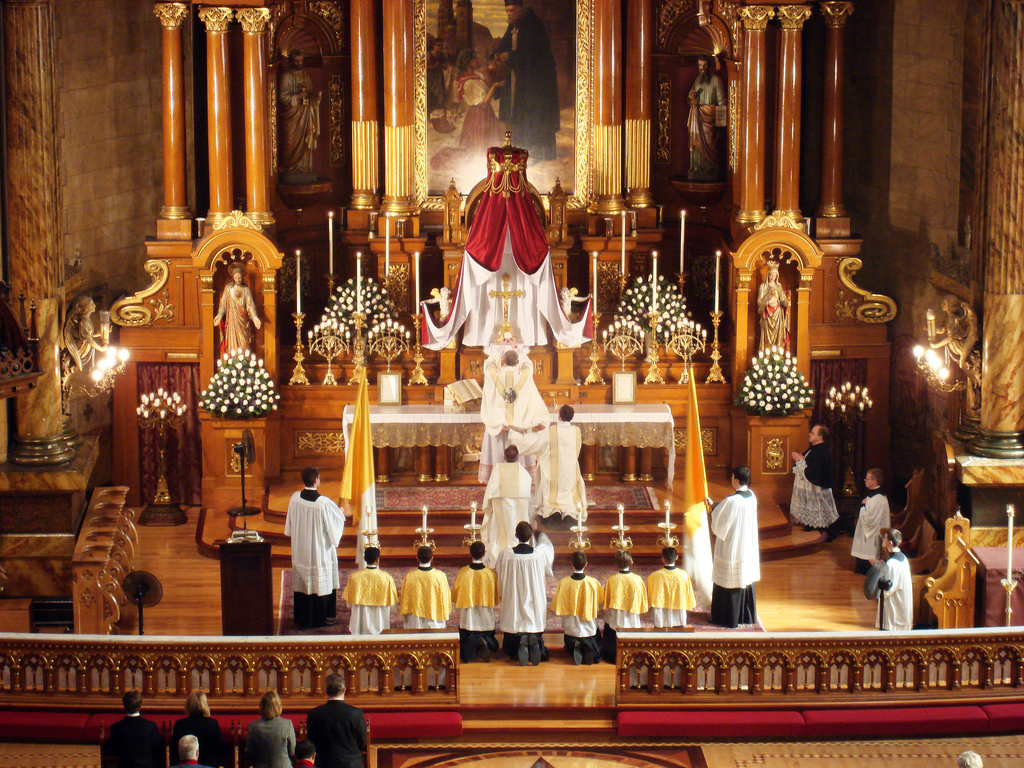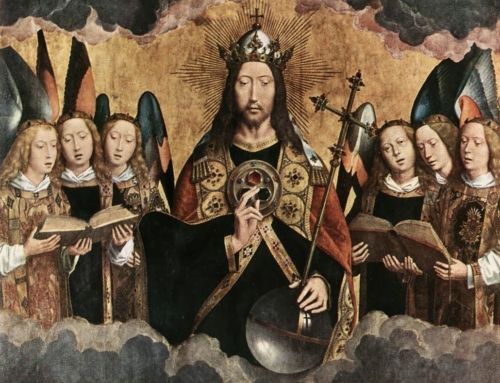Sometimes when I’m visiting a parish I come across this odd practice of fitting as many people as possible into the processional. They’ve got robed choir members, then all the extraordinary ministers of communion, the lectors, the catechists, all the children, a couple of Boy Scouts, the Parish Administrator and the Janitor.
Everybody has to troop in, and then just about everybody has to be given some sort of job to do.
Why is this?
Probably this paragraph from Sacrosanctum Concilium, the Vatican II document on liturgy:
Mother Church earnestly desires that all the faithful should be led to that fully conscious, and active participation in liturgical celebrations which is demanded by the very nature of the liturgy. Such participation by the Christian people as “a chosen race, a royal priesthood, a holy nation, a redeemed people (1 Pet. 2:9; cf. 2:4-5), is their right and duty by reason of their baptism.
In the restoration and promotion of the sacred liturgy, this full and active participation by all the people is the aim to be considered before all else; for it is the primary and indispensable source from which the faithful are to derive the true Christian spirit; and therefore pastors of souls must zealously strive to achieve it, by means of the necessary instruction, in all their pastoral work.
Many of the abuses in the modern celebrations of the Mass come down to a kind of bogus egalitarianism–in which everybody is supposed to be appear to be treated equally.
This is not what the council documents envision. The words call for “fully conscious and active” participation, and the context of this paragraph is that it comes right after a discussion of private devotions.
Let’s be honest.
Before the Council many people tell me that the Mass was all in Latin. They didn’t understand what was going on. The priest was facing away from them. The bad Catholics sat and stared and the good Catholics knelt and prayed their rosary. In other words, they weren’t tuned in to the Mass at all.
The Council therefore calls for everyone to sit up and pay attention. It didn’t call for everyone to have a part to play the way everyone in a goofy, lefty school has to get a trophy for participation.
I think a lot of Catholic priests, with good intention, wish for everyone to take part and not simply be observers, but perhaps they don’t understand how much Catholics DO take part–even in a Mass that is celebrated traditionally.
We know this because when Protestants visit they comment, “Geesh. You folks are up and down and doing something all the time. We just sit there.”
This is true. The typical Protestant service is very much like being in a theater. The newer Evangelical churches are equipped with theater seats and a stage with lighting effect and music center. The congregation, for the most part, just sit there to listen to a long sermon. They get up to sing and that’s about it.
On the other hand Catholics, from the first moment they enter church, participate physically. They cross themselves with holy water. They genuflect before going into the pew. They kneel to pray. They get up to go and light a candle at a side altar shrine. Then when Mass starts they stand for the procession, sit for the Ministry of the Word, stand for the gospel and creed, kneel for the prayers, stand for the offertory, etc. etc.
Through their physical actions they are involved and moving and paying attention (or should be) all the time. Furthermore, when they kneel to pray and stand to sing and come forward to receive communion–all these are not just physical actions, but inner actions of prayerful and worshipful participation.
“Fully conscious and active” participation therefore means that each individual needs to be fully conscious and active. What modernist liturgists have done is dropped the word “conscious” and said “full and active” and by “full” they mean everybody has to do something.
That’s not what the wording actually means, and it has led to this goofy idea that everybody has to carry something forward in a procession at some point in the Mass, or they have to be up in the sanctuary cleansing the vessels or putting stuff away or whatever.
Beautiful how the Mass would be celebrated simply, nobly and reverently if we only paid more attention to the true wording and meaning of the documents of Vatican II rather than the odd interpretations that have become so popular.







[…] participation by all the people.” (SC, II.14) Father Longenecker has some sound words on this HERE. The validity of Mass is not contingent upon you having a job. Unless, of course, you are the […]